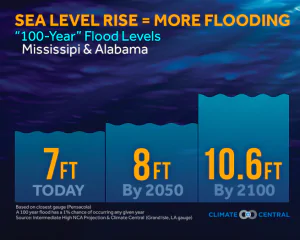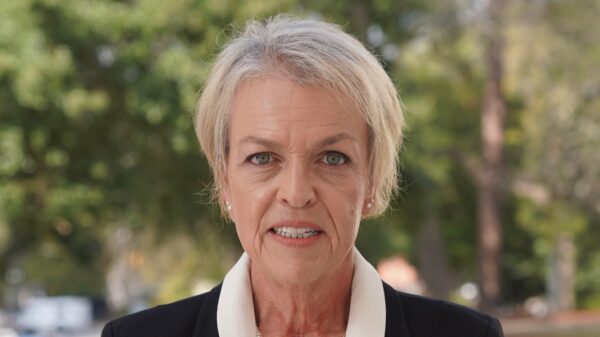Alabama’s coastline lost $158 million in residential property value in just more than a decade due to tidal flooding caused by rising sea levels and climate change, according to a study by Columbia University and the New York-based nonprofit First Street Foundation.
Among all 15 East Coast states, that loss amounted to $15.8 billion, according to the study released in February.
In Alabama, Gulf Shores was hit hardest, with $26 million in relative home values lost between 2005 and 2017, followed by Mobile at $25.8 million and Dauphin Island with $23 million. Orange Beach saw $15.6 million in losses and Bayou La Batre recorded $7.8 million.
Florida has seen the greatest loss in relative home values at $5.4 billion, according to the researchers, followed by New Jersey at $4.5 billion and New York at $1.3 billion. Researchers are analyzing approximately 13.3 million real estate transactions to determine those losses.
Meanwhile, across all U.S. coastal communities, builders have constructed nearly 20,000 new homes in areas that are at significant risk of chronic coastal flooding by 2050, according to a separate study released Wednesday by the real estate database company Zillow and Climate Central.
Some key findings of the study:
- Unchecked greenhouse gas emissions would put 3.4 million existing homes worth $1.75 trillion at risk of inundation from a 10-year flood by 2100.
- By 2050, those figures are 802,555 homes worth $451 billion – and 19,250 of those homes were built after 2009. New York, Tampa, Virginia Beach and 21 other cities built at least 100 homes in the risk zone during that time.
- Florida would have the most homes at risk, 1.58 million, by 2100, followed by New Jersey with 282,354, Virginia with 167,090, Louisiana with 157,050 and California with 143,217 — assuming levees and other infrastructure defenses hold.
Researchers from Zillow and Climate Central based the study’s sea level projections on a recent peer-reviewed research paper that built off global data from the Intergovernmental Panel on Climate Change.

“The results are clear. If the world makes moderate cuts to greenhouse gas pollution — roughly in line with the Paris agreement on climate, whose targets the international community is not on track to meet — some 17,800 existing homes built after 2009 will, by the year 2050, risk inundation by a 10-year flood,” according to the researchers. “The figures for 2100 are more than two times higher — and more than three times higher if pollution grows unchecked.”
“This research suggests that the impact of climate change on the lives and pocketbooks of homeowners is closer than you think,” said Skylar Olsen, Zillow’s director of economic research and outreach, in a press release on the study. “For home buyers over the next few years, the impact of climate change will be felt within the span of their 30-year mortgage.”
Researchers also created an interactive map that displays the flood-risk zones and a sea-level tool that details the number and value of homes at risk by location.
Jeremy Porter, a Columbia University professor and First Street Foundation statistical consultant, said he expects these flooding problems will only get worse.
“From Maine to Florida and through the Gulf Coast, we have seen the same phenomenon,” Porter said. “Increased tidal flooding has led to a loss in home value appreciation. We expect this trend to not only continue in the coming years, but to accelerate along with the accelerating rate of sea level rise.”





















































